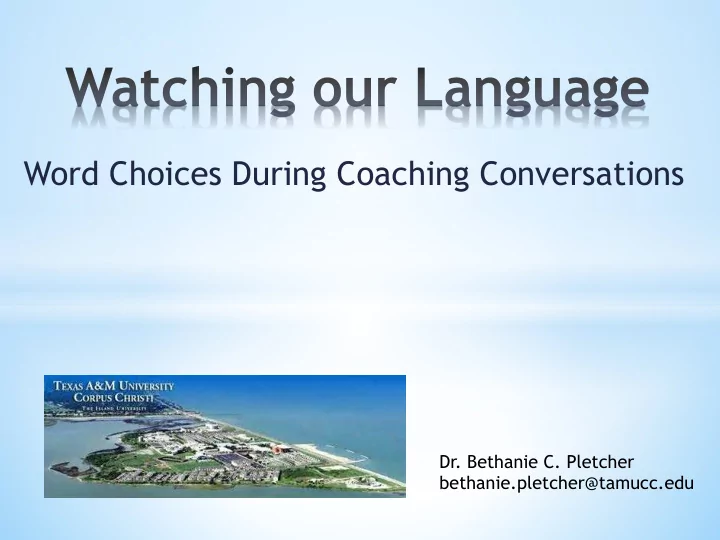

Word Choices During Coaching Conversations Dr. Bethanie C. Pletcher bethanie.pletcher@tamucc.edu
It is through conversation that teachers have opportunities to question, hypothesize, clarify, rethink, affirm, and acquire more complex understanding of how children learn to read and write (Forbes, 2006 ). Talk is the central tool of teachers’ trade. With it they mediate children’s activity and experience and help them make sense of learning, literacy, life, and themselves (Johnston, Choice Words, 2004) .
* Session attendees will add to their knowledge of coaching another dimension of the complex skill. They will collect strategies for talking with colleagues in ways that encourage deeper thinking and reflection, as well as independent problem-solving. Participants will also walk away with actual phrases and questions to use when coaching teachers. * Tuning our talk * Communication * Discourse * Questioning * Scenarios * Coaching demonstration * Coaching practice
* * Verbal Nonverbal Any authoritarian manner of presentation which sacrifices rapport for control is likely to be counterproductive (Rivers, 1989). Friends and nonverbal communication
* Conversational and collaborative * Experimental and exploratory * Differentiated * As much about character as it is about competence Responsive coaching requires the development of an eye for what to notice in teachers; an active, yet patient ear for learning where they are coming from; and a tongue that is not hasty and carries a language of growth, reflection, and agency (Johnston, in Dozier, 2006) .
* The hidden meaning of questions * Too many questions?? * Intentional * Open-ended * Positive * Plural forms * Tentative language * Transcript examples
* The message paraphrasing sends * How to paraphrase: * Attend fully * Listen to understand * Make paraphrase shorter than original statement * Paraphrase before asking a question * Transcript examples The Office and Active Listening
* Questions to ask yourself about your word choices or “the metacognitive coach” * Words to avoid * Transcript examples
* Why we wait * Transcript examples
* Change * Reasons for resistance * Tips The greatest gift we can give a coach is to love someone enough to let them grow, to not solidify them in our perception as “the resistant teacher” or “the grouchy one.” To coach with love means we can allow someone to grow beyond our old definitions of them and we can see the tiny steps they take as they attempt to change ( Wall, 2015). * If all else fails…
* Pick several scenarios * How might you change what the coach asked/said in order to encourage a positive and thoughtful teacher response?
Bean, R. (2010). Effective literacy coaching: A journey, not a destination. In J. Cassidy, S. D. Garrett, M. Sailors (Eds.), Literacy coaching: Research & practice (pp. 133-144). Corpus Christi: Texas A&M University - Corpus Christi. Casey, K. (2006). Literacy coaching: The essentials . Portsmouth, NH: Heinemann. Dozier, C. (2006). Responsive literacy coaching: Tools for creating and sustaining purposeful change. Portland, ME: Stenhouse. Forbes, S., & Briggs, C. (2006). Fostering teacher learning through dialogue in training sessions. Journal of Reading Recovery, 6 (1), 38-48. Heineke, S. F . (2010). Reading coaching discourse. In J. Cassidy, S. D. Garrett, M. Sailors (Eds.), Literacy coaching: Research & practice (pp. 133-144). Corpus Christi: Texas A&M University - Corpus Christi. Johnston, P . (2004). Choice words: How our language affects children’s learning. Portland, ME: Stenhouse. Kise, J. A. G. (2006). Differentiated coaching: A framework for helping teachers change . Thousand Oaks, CA: Corwin Press. L’allier, S., Elish-Piper, L., & Bean, R. M. (2010). What matters for elementary literacy coaching? Guiding principles for instructional improvement and student achievement. The Reading Teacher, 63 (7), 544-554. Stover, K., Kissel, B., Haag, K., & Shoniker, R. (2011). Differentiated coaching: Fostering reflection with teachers. The Reading Teacher, 64 (7), 498-509. Toll, C. A. (2005). The literacy coach’s survival guide: Essential questions and practical answers. Newark, DE: International Reading Association. Wall, H., & Palmer, M. (2015). Courage to love: Coaching dialogically toward teacher empowerment. The Reading Teacher, 68 (8), pp. 627-635.
Recommend
More recommend